HCI conducted an offline session on August 6, 2023 at Cold Lava Studio, Mulund (E), Mumbai. It was led by Sulabha Subramaniam, a practising Mental Health Professional since more than 23 years.
All of us are faced by failures in life at one time or the other, whether at work, in romantic relationships, in marriage or in friendships or maybe we succumbed to some addiction. At times, we take failure to heart and this can affect our psyche for years to come. How can we break out of this mindset of being a failure, forgive ourselves and move on? That was the topic of the day for this HCI session conducted by Sulabha.
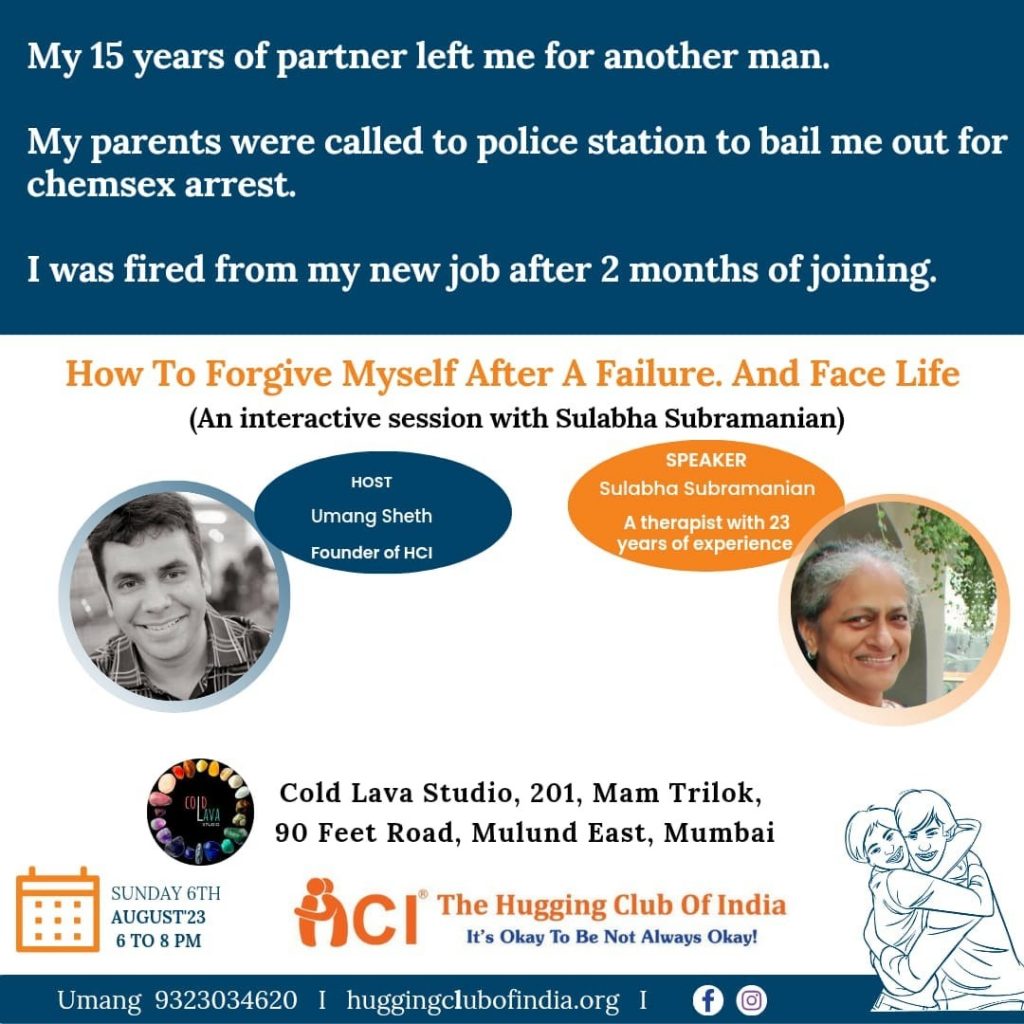
Being a Senior Therapist at the Institute for Psychological Health (IPH) & Mosaic Center, both in Thane. she has been associated with various renowned organisations like IPH, SEARCH (Gadchiroli), Kshamata & SUPPORT (Mumbai) in different capacities since many years. She is involved with different rehabilitation groups and facilitates a support group L.O.C., for parents of children with serious behaviour issues. She is the coordinator of Maitra, a tele-counselling helpline of IPH launched in 1998, for those who need emotional support in distress. She has often been invited as a guest faculty for lectures and workshops at various institutes.
Sulabha broke the ice by sharing her own experiences where she had felt like a failure. She comes from a humble back ground and from a family that lived on meagre means. Her parents were married late in life and by the time she grew up, they both had health issues. Her mother was bed-ridden for quite a few years. So Sulabha had seen her parents struggle since childhood. But inspite of life’s many difficulties, her parents would try to help out others. Many people used to take advantage of their nature and manipulate them for their own selfish ends. But when her parents faced tough times, those who were the recipients of their help and love in the past did not come forward to reciprocate the same. Sulabha felt betrayed and also felt a sense of failure because she saw people taking advantage of her parents and could not stop that from happening. Her good natured parents continued to help others selflessly and unconditionally.
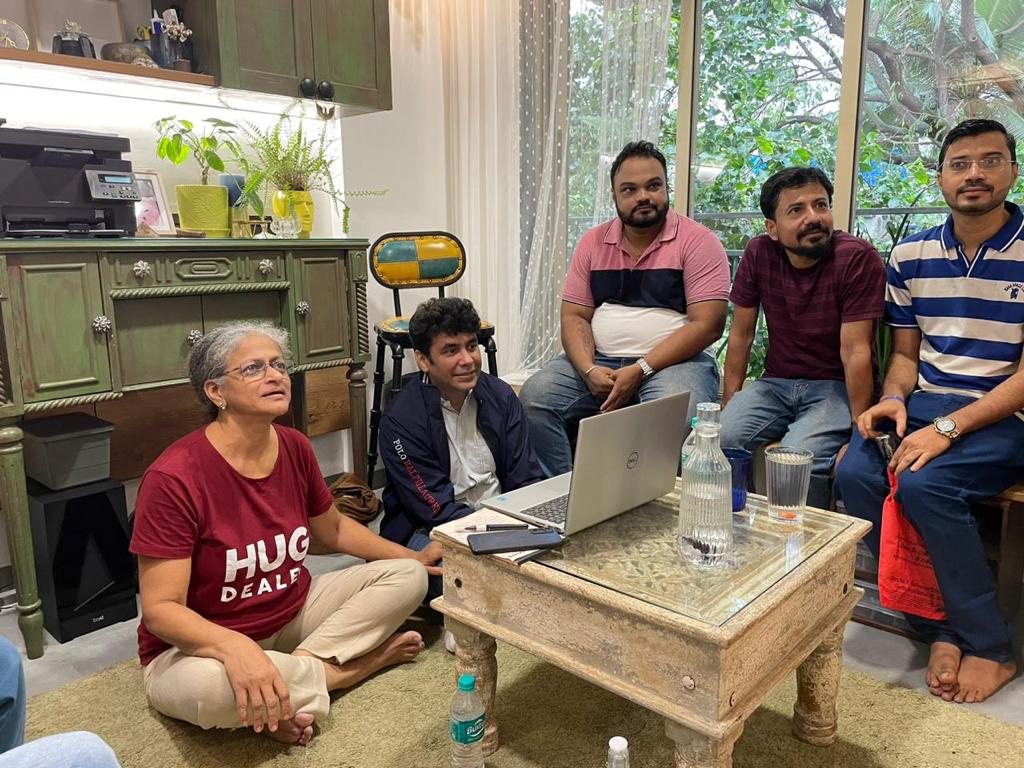
Even after marriage, she spent a lot of time taking care of her ill parents and that affected her emotionally too, as she felt a sense of failure when she realised she could not help them beyond a point. She was quite frank enough to admit that she feels this failure sometimes even now, decades after they passed away. She too inherited their nature of helpfulness, but she did have her moments of doubt where she debated on whether she should help others as she had seen how people can take advantage of such a good-natured person. Eventually she realised (via introspection and therapy) that being helpful is her core nature and she cannot run away from it. She did not want to be a person who is not true to her core beliefs. She wanted to be herself. She came to a realisation that the way others may behave cannot take away her happiness of loving, connecting, giving and helping others. But she also has the awareness now on when to let go without taking it to heart. So her journey began from a level of not forgiving herself and others to eventually coming to an acceptance of her nature and being aware of how others could behave and when to let go.
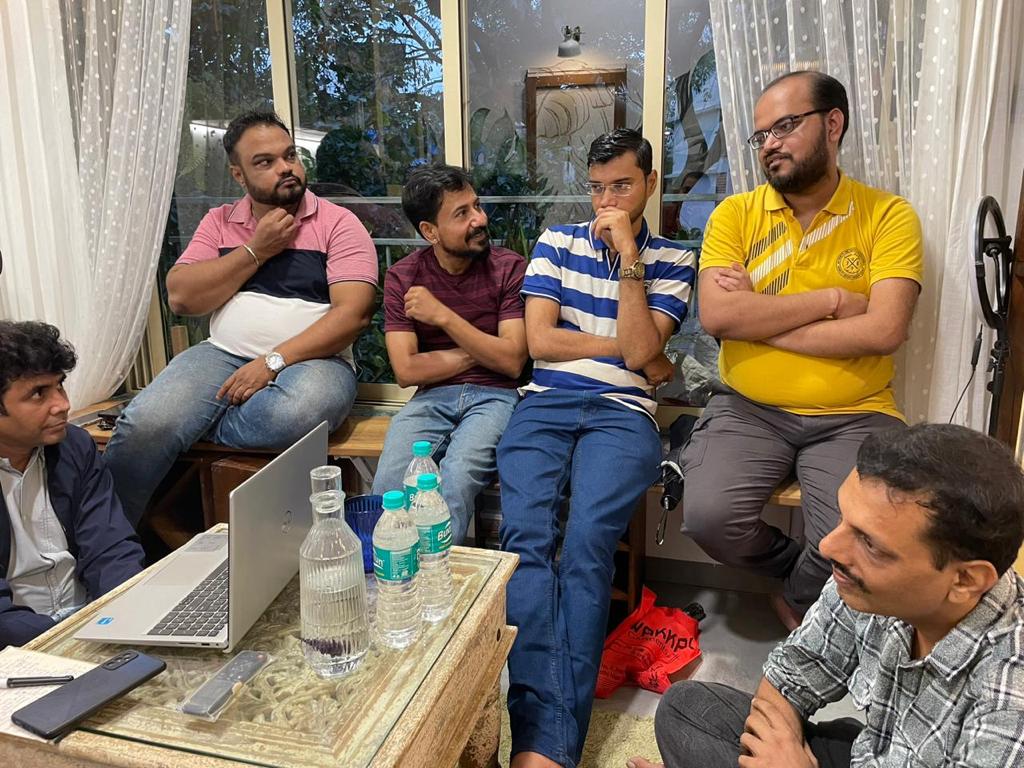
Sulabha made the session interactive by asking the participants about how they defined failure and the following responses came about:
– Not reaching your expectation
– Stuck in a loop of not being able to process something
– Feeling of being lesser in comparison to your peers
– Feeling you should have done something but didn’t
– Feeling you are lesser than than others and therefore not being able to progress
This sense of failure causes several emotions to build up inside us like sadness, disappointment, guilt of having failed someone else or yourself, anger, sulking, hopelessness, helplessness and loneliness.
Behind these emotions are certain typical thought patterns:
– If something that I worked to achieve did not happen, it is unpardonable and I am a failure (feeling of worthlessness comes in)
– If I fail in a relationship, marriage or a job, it means I am unlovable. I am less than required or lacking in something.
– I am a failure, so I am terrible. No one is going to like me. I will be rejected by everybody and I will forever be alone. I wasted my life (feeling that I am useless).
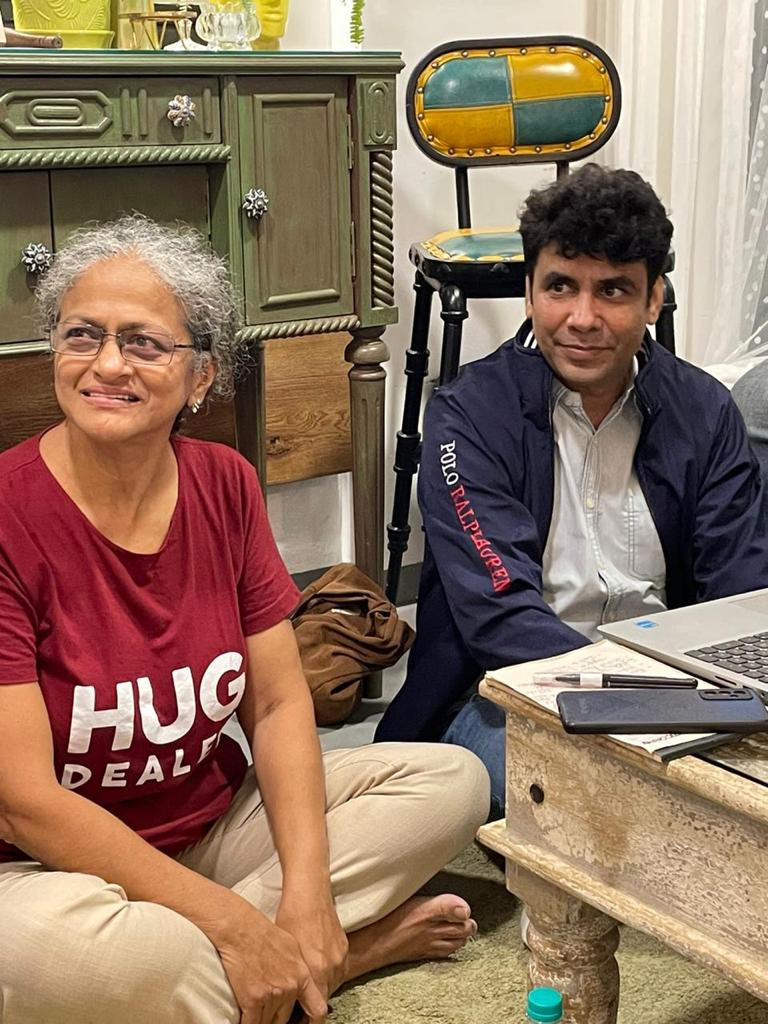
We are inculcated with a false belief since childhood that only when everything is meeting our expectations or when we are happy and feeling nice that is the only correct way to be. However, life is not a bed of roses. There are always going to be ups and downs. When we are feeling sad, bad, angry, upset, etc at that particular moment we feel our world is collapsing or there is no point in life or life is hell, whereas this is simply how life is for everyone. We start finding faults with ourselves, with others and with the world. We get stuck in a loop of such negative thoughts. Sometimes this feeling can persist for several years.
One way out of this to close your eyes and think back to the day which caused you to feel like a failure. Think of how terrible you felt that day. And then immediately switch to say, one year later or the present moment. Now evaluate how you feel about that day in the past. Rate on a scale of 0 to 10 on how strong the feeling was on the day of the incident and how strong it is today. You will realise that your worst fears of that day did not actually materialise. You are still able to function in life despite going through that traumatic day in your life. You will realise that intensity of your feelings of anger, sadness, desperation, etc that you felt on the day of the trauma is much reduced today. Some days when you get triggered by a memory of the trauma, the feelings may spike. But by and large, the intensity would be reduced now as compared to the past. So it’s all a matter of your thoughts. In one intense moment, you had probably thought your life was over and nothing mattered. But the unconscious or sub conscious mind does realise that life goes on, despite such incidents. So eventually our mind begins to come to terms with that incident.

Now let’s go back to the responses we received at the beginning about our definitions of failure and think about whether we perceive it from a lens of “I am a failure” or “Was that event (maybe a breakup or a loss of job or a project that didn’t work out) which happened a failure?” The moment we start seeing it from the latter lens, our perspective changes and we do not personalise the failure. When we change our perspective and move on from our failures, we begin to have an open mind that can discover positive things that came out as a result of that failure. Even in the creation of the universe, a big bang needed to happen to be able to create new worlds. Change always happens after a chaos. Thank whatever has happened in your life because you will learn something new about yourself and it will prompt you to take some action to change your life for the better.
However, this change in perspective does not immediately occur when the event of failure happens because at that time our mind is in a whirlwind of emotions. Once some time has passed and there is a distance from the failure, our emotional brain has settled down and our analytical brain can take over and we can try to evaluate what positives remain in our life. For example, when players are playing on the field they may not have the complete picture of the game, which a coach would know when viewing the game from a distance, as the coach would be seeing the larger perspective. So this perspective comes when the event is looked at from a distance.
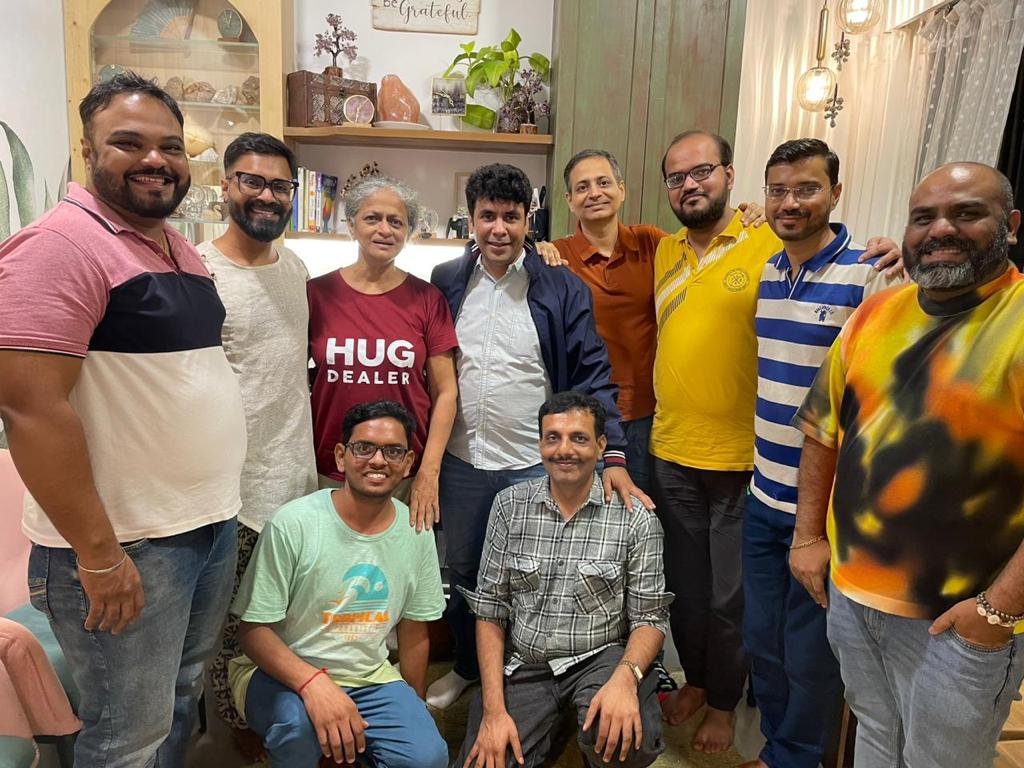
We need certain tools to be able to channelise our analytical mind to look for positives. They could be any of the following:
– A support system; maybe a friend to lean on or a mental health professional.
– Journaling our thoughts can also help. Initially when we start journaling, negative thoughts may come in but later on, our thoughts will move on to more positive ones that exist in our lives, which we may have taken for granted. Journaling also gives perspective when done regularly.
– Some may find tools such as exercise, music, meditation to be able to switch on the analytical brain.
There is no fixed tool that everyone can use. One has to be find out what works for them.
Over time, by using the tools explained above we may come across a pattern that is repeating in our life. For example, we may realise that we are good at most aspects of our life but our relationships are frequently failing. Once we accept this, we can re-wire our brain to change that.
How to re-wire our brain wiring to look back at failure, see the positives and change ourselves?
Our sense of self has an adult, a child and a parent. Consider a situation where your elders (parents, family, teachers) have negatively affected you in childhood (e.g. by constant criticism) causing you to have a negative self-image, low self-worth, lack of confidence or an inferiority complex. This biological parent influences our inner parent in the sense of self. As a child we have impressionable minds and our elders’ words and thoughts get imbibed within us. The child in our inner self, in such an instance, begins to imbibe self doubt, fear, hiding, being withdrawn, low self image/ low self worth. The adult in our inner self much later on in our life begins to realise that his personality turned out the way it because of the influences in his childhood.

The way to re-wire the brain is to recognise the inner parent and stop listening to it anymore because the inner adult now has the realisation and can take over to change the thought patterns away from the negative influences that were imbibed in childhood towards more positivity. The adult can now create a new parent in his sense of self that can ooze positive influences like being protective, loving, caring, encouraging, inspiring, giving, understanding, accepting, etc. He is no longer bound by the old parent and the associated thoughts imbibed earlier.
An exercise that works is to draw the image of this new parent on a paper and write down the positive qualities you want in that parent and stick this paper on a place where you can see it daily so that you are constantly reminded of it and the inner self imbibes the qualities of this new parent the same way that the inner child had imbibed the qualities of the old parent in childhood.
Next, draw an image of a child near that drawing of the new parent and write down the positive qualities you want in that child, such as confidence, fearless, free, happy, loving. This can happen when the new inner parent and the inner adult constantly feeds the new inner child with this positivity. Also, remember to give yourself a hug everyday.
Looking at these drawings and qualities daily is essential because our brain circuits need to be rewired to accept these new inner parent and the new inner child. This exercise needs to be done for a minimum of 21 days but preferably for 30 to 45 days for the brain wiring to change gradually. It’s like forming a new habit of thinking and believing. This is how we change what we think about ourselves and how we can change our behaviour towards ourselves. With this we are changing our self beliefs and improving our self worth. By changing to our new thought patterns we will eventually get out of our old behaviour patterns that were causing events to fail repeatedly.
Once we are able to re-wire our brain, we will automatically stop ourselves when we try to follow our old behaviour because now we are aware about it and the consequences of following the old thought and behaviour patterns. We will be able to deal with situations with a new perspective. If we get criticised now, it is not the old inner child that will respond to the situation anymore to imbibe that criticism. We can now agree to disagree with someone’s criticism about ourself because we know now it is only their opinion about us and we need not share that same opinion about our own self. Simply thinking about this exercise will not allow us to reach this stage. It needs to be done practically to re-wire the brain’s thinking circuits. The first 21 days we need not do too much of practice. Take it slow, then later start doing it more consistently.
We need to remember that the change in our thought and behaviour patterns does not mean we will never feel sad, angry worried, disappointed in future. That’s not going to happen. We will still commit mistakes and go through negative emotions because it is natural to do that in life.
Suppose you are walking on the street and someone pushes you hard from behind to go forward. You will naturally feel angry or irritated. It’s because these emotions are important at that time. It will make you realise that you should not walk on a busy street lost in your own thoughts and without being mindful of your surroundings because any such incident can happen. Your anger will remind you of this in future. Sometimes negative emotions are meant to keep you safe, to train you to be better at survival. They are a wake up call. Suppose you lose a relationship. You will feel sad, lonely, disappointed. It is normal to feel that. In fact, if you don’t get such feelings at that time, that would be abnormal because then you will do the same mistakes in the next relationship. Such feelings make you realise what could have gone wrong and what mistakes you should avoid or what you need to fix in yourself to be ready for the next relationship. Emotional pain is normal and is required in order to be wholesome. We are not robots. We are humans who can feel. We simply need to make sure that we do not stay with the same negative emotion throughout and get caught in a negative loop.
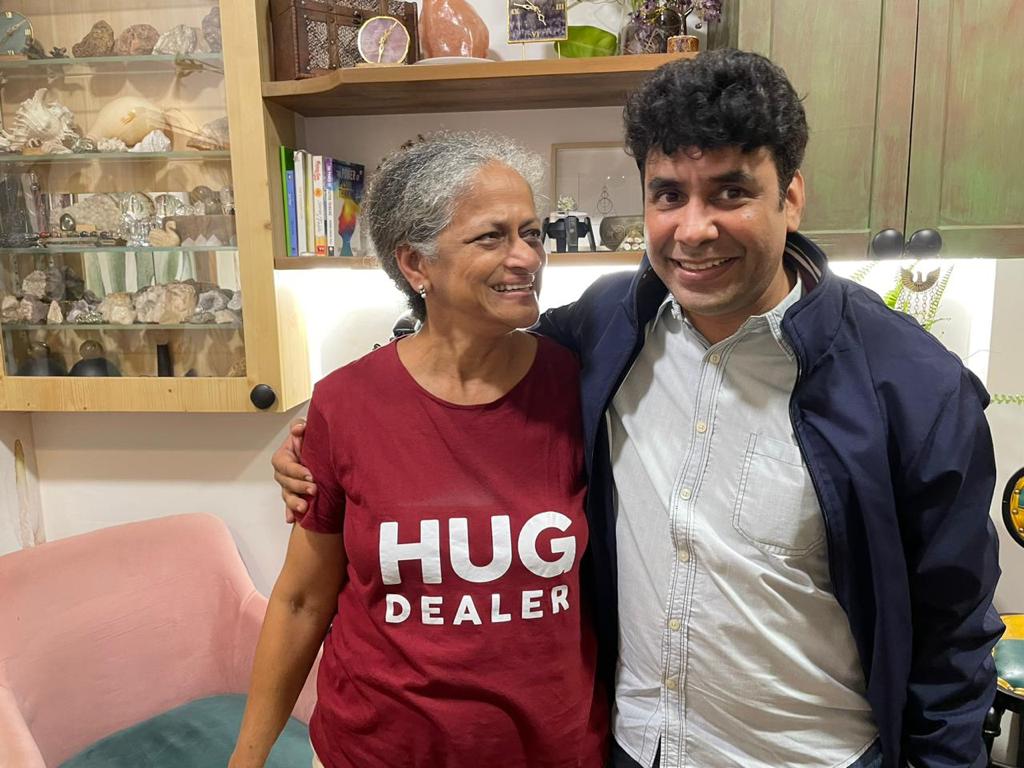
Sometimes when we get negative emotions, we feel the need to control our emotions. But that is also not healthy. Because then we will be leading an artificial life, always trying to be steady and trying to be not affected by anything. Instead what we need to do is regulation of our emotions, rather than control. Sulabha asked the participants about what they did to calm themselves when things are not going their way. Some responses were:
– calling friends to connect with them and talk about it
– walking
– watching a film or OTT apps
– eating a favourite dish
– pausing and reflecting
– outdoor activities
– listening to music
– looking for information to devise a solution
– yoga / meditation / chanting
– watching motivational videos
– letting it go and moving on to another task
– crying
– hugging someone close
The thing is that when we are faced with a problem we frantically begin looking for a solution and are wondering what to do. However, the preparation for any eventuality has to be done when everything is going as per expectations and when we are in a relatively calm state. To prepare our brain for difficult situations, the steps we need to take are long term in nature. Imagine the fruit of a tree. You do not instantly get that fruit. First the soil needs to be ploughed, then the seed needs to be sown, then it needs to be watered regularly and then after few days, a sapling emerges. If it gets regular nutrition and water, it then becomes a healthy fruit bearing tree over several months. The point is that we need to practice techniques when things are relatively okay in our life so that once a failure type situation arises, our mind is already equipped to deal with it.
In our culture, the concept of self-care is not really given much importance. It is considered as being selfish. But self-care is extremely important. There are things we need to do daily to take care of our self.
One is physical stuff like sleeping on time and getting enough sleep, eating nutritious food, taking enough water, doing physical exercises. Exercises, besides making us physically fit, also release serotonin and dopamine to regulate our mental well-being. So when we are in a difficult situation, our body is already in a good state and prepared to deal with it.
Second is psychological self-care about how we handle emotions and relations. We need to have a nurturing and happy relationship with our own self first. Also, we are social animals. So it is important to keep connections with people, but not at any cost. We need to keep boundaries too. Over our life time, we need to collect 5 close people who we can call at any time. We need to nurture these relationships. It won’t happen overnight. When we do find such a person, taking care of that relationship is important. But it has to be a reciprocal relationship. They also need to take care of us the way we take care of them. One sided relationship is co-dependency, which is not healthy. The person has to be caring, genuine, reasonably available, trustworthy (who would keep confidentiality) and a good listener. The people that we like may not be the people who can listen. If they have all other qualities, except good listening skills, we can teach them how to be good listeners.
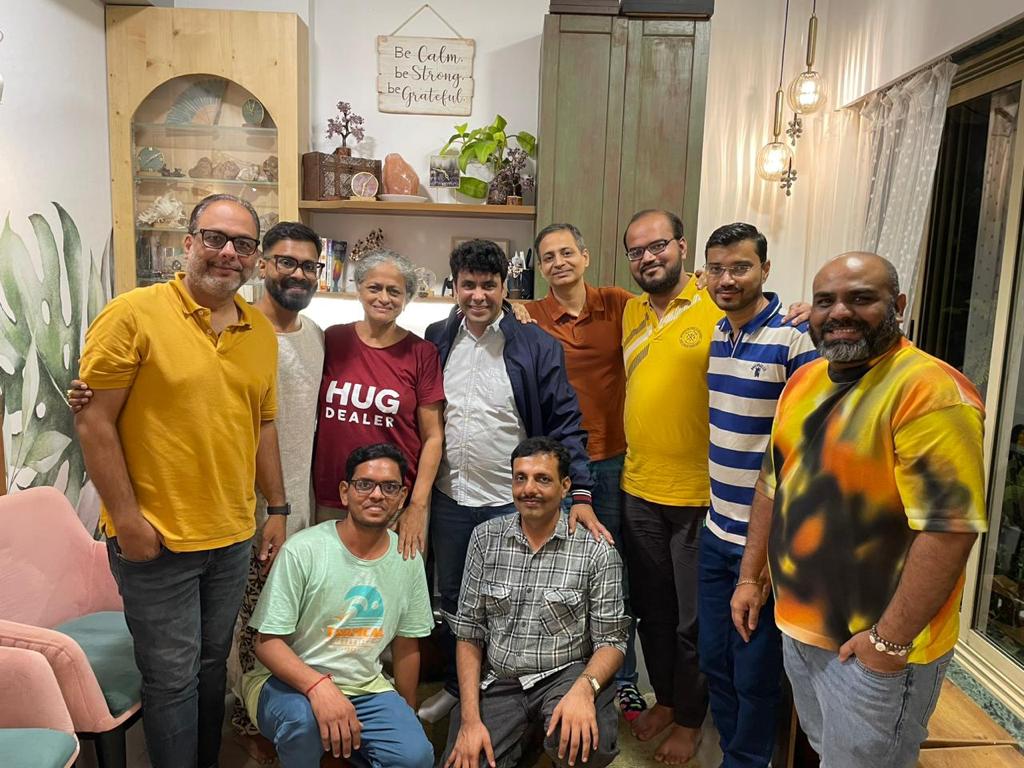
Even after having a close group of people in your life, our conservations and connection with our own self need to continue and increase. Emotional ups and downs happen to everyone but we need to recognise our limits. Once we realise we are reaching our limit of being able to bear a difficult situation, we need to take help either from these 5 close people or from good intentioned well wishers in our lives, who we have earlier related to (e.g. a teacher or a relative or a neighbour) who could have some knowledge about the issue we are facing. Suppose we are facing a financial issue in our life and our close group of people do not have any financial background. So at such times, we need a well wisher who has reasonable knowledge or comfort level with finance who can at least understand our problem, if not solve it. We also need to be open and proactive in seeking help from mental health professionals.
Sometimes deficiencies in certain vitamins such as B12, D3 cause mental health issues like anxiety and depression. Thyroid dysfunction can also cause emotional ups and downs. Anaemia also can be a cause. So iron levels in body should be normal. Blood sugar imbalance can also cause emotional instability.
We need to try and limit your social interactions with people who display negative vibes, toxic people or manipulative people. We need to listen to our body antenna (gut feeling) about the vibes another person is displaying. If we see a series of pattern with someone where they are constantly talking about the own problems and not doing anything to resolve them despite our efforts to help, we need to create our boundaries with such people and safeguard our interest. People whose words don’t match their actions (saying one thing to us and acting against our best interest when we are not around) are not the best people to spend our energies on.
Many a times we feel if we maintain a distance from such people or if we are firm about maintaining boundaries, we may be looked upon as bad, rejected by people, ridiculed, labelled as non-cooperative or we will not fit in or will be rejected by everyone and therefore no one will talk to us and we will become lonely. But let’s try this: honestly look back at past incidents of our lives where we would have created boundaries for self-care with certain people or even those events where we had faced failure. Did everyone else always reject us in future because of that and did our worst fears come true? Obviously not. Nothing permanent happens as per our worst fears.
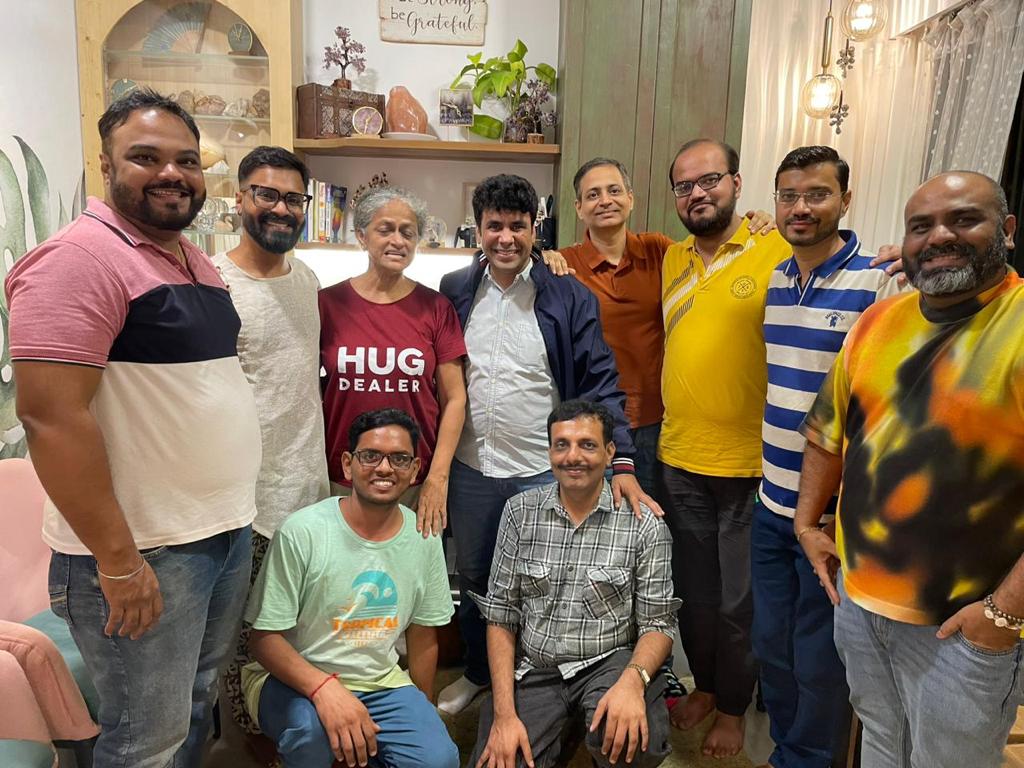
Highlights from the Q&A session:
Why do we feel as a failure when we do not get validation on social media and how to deal with it?
We need validation because it is connected to our self-worth. It is a human need and it is a valid need. We are social animals. Validation or appreciation from others creates a sense of belonging. But the problem arises when the full 100% of this need is transferred to others in our mind. This means if others assure us that our social media post was good, via their likes and comments, we are satisfied and happy. But if we do not get the expected number of likes, we feel that no one likes us and that feeling affects our self worth. We hand over the complete power of our self worth to others. Suppose we change our thought patterns in a way that 70 to 80% of the validation comes from ourselves. We like a post and we share it believing it will be helpful to the group and it makes us happy. Only the remaining 20 to 30% of our happiness depends on external validation. So when the external validation does not come, it still feels a bit disappointing but our world does not collapse as in the first instance.
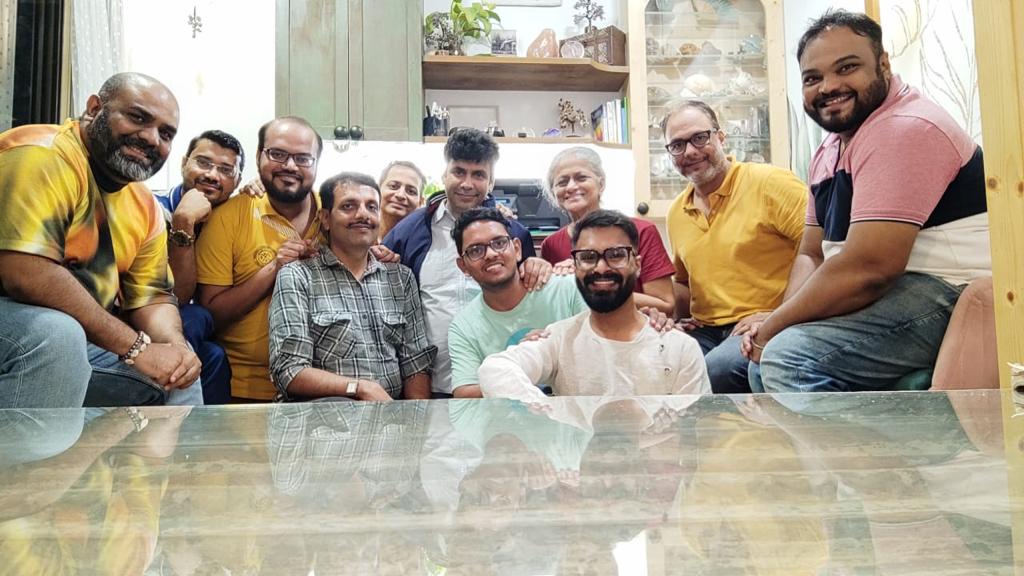
I am coming out of chem-sex addiction but people now see me as being a drug addict. Whatever I do, I feel people judge me for that. My friend does not talk to me probably because he thinks I am a drug addict. I don’t get invited to parties probably for the same reason. I feel I don’t get respected because of my past failure of drug addiction.
Here we need to change our perspective. Suppose you were having chem-sex until 6 months ago. Before that were you being invited to all the parties? Did everyone love you and enjoy your company? So your interpretation of this may be faulty. First ask yourself, how do you feel about yourself.
If some people are actually ignoring you because of your past, ignore them. Out of the many people that you know and interact with, everybody would not do the same. Yes, it will be hurtful. And you will get such thoughts. But whether to plant that thought in your mind and keep nurturing it and therefore evaluate all future interactions with others through that lens is not proper. Uproot that plant before it begins to grow firm roots in your mind. “I feel bad” is a valid feeling in that moment but “I have been rejected by the world and this is how it will be for the future” is not.
In addition to all what we have discussed there is another aspect of self-care, which is spiritual self care. We need to practice mindful breathing. There is a YouTube video of UCLA which explains this beautifully: https://youtu.be/YFSc7Ck0Ao0
It was a marathon 3 hour session but we gained knowledge of a lifetime. Of course, the samosas and chutney prepared by Mitesh (an HCI family member) certainly helped and the warmth exuded in the confines of the Cold Lava Studio (no pun intended!) by our gracious and welcoming host, Saurabh Masurkar, was the icing on the proverbial cake. As always, the session ended with hugs and smiles all around and memories to take home.
–Written by Amit Rai
–Edited and posted by Mahrukh
